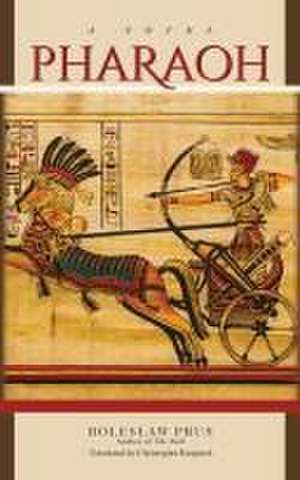Pharaoh
Autor Boles¿aw Prusen Limba Engleză Paperback – 29 oct 2024
by noted Polish writer Boleslaw Prus. " . . . unique in world literature of the nineteenth century"--Czeslaw
Milosz
Imbued with poetry, leavened with humor, and
graced with moments of transcendent beauty, Pharaoh offers a compelling
picture of life at every level of ancient Egyptian society. As the story unfolds, Egypt is experiencing
internal stresses and external threats that will culminate in the fall of its
Twentieth Dynasty and New Kingdom. The young Pharaoh Ramses learns that
challenging power leaves him vulnerable to seduction, defamation, intimidation
and even assassination. The ultimate lesson learned by Ramses is the power of
knowledge. Prus is
a distinctive voice in world literature and was Joseph Conrad's favorite Polish
writer. This new edition of Christopher Kasparek's translation of Pharaoh vividly
brings this extraordinary novel to life. It includes a detailed foreword and annotations,
based on extensive research and textual refinements, that will enhance the
reader's appreciation not only for ancient Egypt, but also for Prus'
composition process. Pharaoh has been translated into
twenty-three languages and was adapted as a 1966 Polish feature film.
Preț: 125.73 lei
Nou
Puncte Express: 189
Preț estimativ în valută:
24.06€ • 25.21$ • 19.89£
24.06€ • 25.21$ • 19.89£
Carte disponibilă
Livrare economică 21 martie-04 aprilie
Livrare express 06-12 martie pentru 37.99 lei
Preluare comenzi: 021 569.72.76
Specificații
ISBN-13: 9780781814508
ISBN-10: 0781814502
Pagini: 516
Dimensiuni: 152 x 229 x 28 mm
Greutate: 0.68 kg
Editura: Hippocrene Books
ISBN-10: 0781814502
Pagini: 516
Dimensiuni: 152 x 229 x 28 mm
Greutate: 0.68 kg
Editura: Hippocrene Books
Notă biografică
Boleslaw Prus (1847-1912), who took the pen surname Prus
from the appellation of his family's coat of arms, at age 15 joined the 1863 Polish Uprising
against Imperial Russia, where he suffered severe battle injuries. He was spared resettlement on Russian imperial
lands and was able to complete secondary school. He studied mathematics and
physics at Warsaw University, until his studies there were cut short by penury. At age 25 in 1872, Prus embarked on a forty-year
career as a newspaper columnist, urging Poles to study science and technology
and to develop industry and commerce. After
achieving great acclaim with his short stories, between 1886 and 1893 he wrote
three novels on the "great questions of our age" The Outpost, The
Doll, and The New Woman. In 1894-95, he completed his only
historical novel, Pharaoh.
from the appellation of his family's coat of arms, at age 15 joined the 1863 Polish Uprising
against Imperial Russia, where he suffered severe battle injuries. He was spared resettlement on Russian imperial
lands and was able to complete secondary school. He studied mathematics and
physics at Warsaw University, until his studies there were cut short by penury. At age 25 in 1872, Prus embarked on a forty-year
career as a newspaper columnist, urging Poles to study science and technology
and to develop industry and commerce. After
achieving great acclaim with his short stories, between 1886 and 1893 he wrote
three novels on the "great questions of our age" The Outpost, The
Doll, and The New Woman. In 1894-95, he completed his only
historical novel, Pharaoh.
